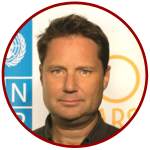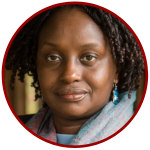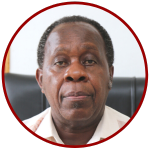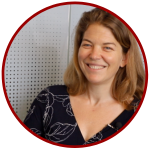From Silos to Synergy: The Potential for "One Health" to Address Inequalities — Lessons from Uganda and the Global Level
Event description
The USC Institute on Inequalities in Global Health (IIGH) invites you to join us for “From Silos to Synergy: The Potential for ‘One Health’ to Address Inequalities - Lessons from Uganda and the Global Level” on Wednesday, November 1, 2023 at 9:00 am PT / 12:00 pm ET / 7:00 pm EAT.
Described as “an integrated, unifying approach that aims to sustainably balance and optimize the health of people, animals, and ecosystems," One Health recognizes that our health as humans is inextricably intertwined with that of our planet and its other inhabitants. One Health provides an approach for understanding and addressing existential threats such as climate change, pandemics and food insecurity.
This panel will explore the nature of inequalities at the human-animal interface, unpacking not only which populations are most affected in different places but also the drivers of these disproportionate risks. Panelists will draw on lessons from their work at the global level as well as national and community level work in Uganda, bringing an inequalities lens to help understand how One Health can help mitigate against these injustices.
Panelists for the discussion include:
- Douglas Webb, Global Health and Environment Advisor, United Nations Development Programme (UNDP)
- Gladys Kalema-Zikusoka, Founder and CEO, Conservation Through Public Health
- Julius Lutwama, Deputy Director, Uganda Virus Research Institute
This conversation will be moderated by IIGH Research Director Laura Ferguson with opening remarks by IIGH Director Sofia Gruskin.
The webinar is hosted by the USC Institute on Inequalities in Global Health.
Please join us on Wednesday, November 1st at 9:00 am PT / 12:00 pm ET / 7:00 pm EAT.
Speakers:

Douglas Webb is the Global Health and Environment Advisor for United Nations Development Programme (UNDP), based in Amman, Jordan. His work focuses on the health and environment nexus; infectious and chronic epidemic response governance and the social determinants of health in the context of environmental change. He was UNDP’s Senior Response Coordinator for COVID-19 (March-May 2020). In 2014-2015 he was seconded to be a Deputy Director in the UN Mission for the Ebola Emergency Response (UNMEER) in West Africa. From 2008-2011 he was with UNICEF in Ethiopia managing UNICEF’s child focused social protection, HIV prevention and AIDS impact mitigation. He was the Chief of the Children and AIDS Section in the UNICEF Regional Office in Kenya (2004-8) and focused on HIV impact mitigation in UNICEF Zambia (1995-7). He served as Global HIV/AIDS Adviser for Save the Children UK (2000-4) in London. His doctoral thesis examined the social epidemiology of HIV and AIDS in Southern Africa (University of London, 1995). He has over 50 published articles and book chapters and is the author of HIV and AIDS in Africa and co-editor of Social Protection for Africa’s Children. He is an adjunct professor at the School of Global Public Health at New York University.

Gladys Kalema-Zikusoka is Founder and CEO of Conservation Through Public Health (CTPH), an award-winning NGO and non-profit that protects endangered gorillas and other wildlife through One Health approaches. She became a National Geographic Explorer in 2018. After graduating with a Bachelor in Veterinary Medicine from the Royal Veterinary College, University of London in 1995, she established Uganda Wildlife Authority’s first veterinary department in 1996. In 2000, she did a Zoological Medicine Residency and Master in Specialized Veterinary Medicine at North Carolina Zoological Park and North Carolina State University, where masters research on disease at the human/wildlife/livestock interface led her to found CTPH in 2003. In 2015, she founded Gorilla Conservation Coffee to support farmers living around habitats where gorillas are found. In 2023, she received an honorary doctorate from her alma mater, Royal Veterinary College, University of London. She has received numerous global accolades for her work. Dr. Kalema-Zikusoka has recently published a memoir “Walking with Gorillas: the Journey of an African Wildlife Vet, about her conservation and leadership journey shaped by One Health. She is the current Chairperson of the Explorers Club Africa Chapter, on the leadership council of Women for the Environment - Africa, and Vice President of the African Primatological Society. She has sat on the boards of Uganda Wildlife Authority, Uganda Wildlife Education Centre, Buganda Heritage and Tourism Board and currently serving on The Gorilla Organization, Bwindi and Mgahinga Conservation Trust, Wildlife Clubs of Uganda and Population Connection boards.

Julius Lutwama is the Deputy Director at the Uganda Virus Research Institute (UVRI). He trained as an Entomologist obtaining a PhD in 1991 and received further specialized training in molecular virology and entomology. At UVRI, he also leads the Department of Arbovirology, Emerging and Re-Emerging Infectious Diseases, the WHO Collaborating National Influenza Center, and the Highly Infectious Diseases Diagnostic Laboratory. He is an Honorary Associate Professor at the Makerere University College of Health Sciences. He has participated in numerous virus diseases studies, outbreak investigations, response and control and is part of teams that have discovered several new viruses in Uganda. He is a member of several local and international health sciences Task Forces, committees, associations and networks. His research interest is in field and laboratory research and epidemic aid investigations of vector-borne viral infections and their arthropod vectors, and other emerging viral infections, defining disease etiologies, ecology, and pathogenesis for disease diagnosis, surveillance, prevention and control. He is currently the Principal Investigator of many studies, including a study on Surveillance, Control and Prevention of Neglected Zoonotic Diseases in Uganda.
Moderator:

Laura Ferguson is an Associate Professor of Population and Public Health Sciences at the University of Southern California, the Director of the Program on Global Health & Human Rights, and the Director of Research at the USC Institute on Inequalities in Global Health. Her research focuses on understanding and addressing health system and societal factors affecting health and the uptake of health services as well as developing the evidence base of how attention to human rights can improve health outcomes. She is interested in innovative methodologies to better understand how societal-level interventions can improve health, and she has carried out many large-scale evaluations with this aim. She collaborates with a range of United Nations agencies as well as foundations, universities, and non-governmental organizations in different countries. She has spent extended periods of time living and working in low-income countries, primarily in sub-Saharan Africa. Her work focuses primarily on HIV, sexual and reproductive health, and child health. She is also an associate editor for Sexual and Reproductive Health Matters and the American Journal of Public Health. Laura Ferguson earned her SM in population and international health from the Harvard University School of Public Health and her PhD from the London School of Hygiene & Tropical Medicine.
Tickets for good, not greed Humanitix dedicates 100% of profits from booking fees to charity


